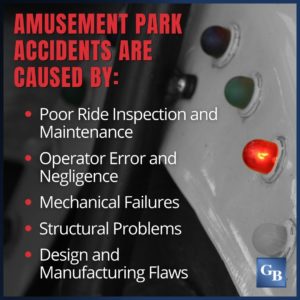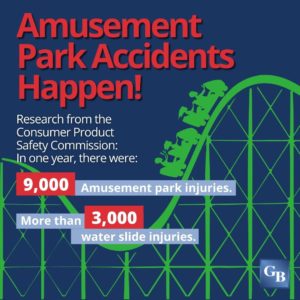Who Is Liable for Amusement Park Accidents?
Amusement Park accidents do happen. According to recent CPSC research, there were nearly 9,000 emergency room visits because of amusement park injuries and more than 3,000 water slide injuries in a single year. Someone needs to be held liable for the medical bills, lost wages, and other damages these people suffer.
There are two main types of liability at stake in most amusement park accident cases: premises liability and products liability.
Premises Liability
Premises liability laws govern what happens if a person is injured on someone else’s property. They determine who will be held liable if the condition of a building, land, or other property causes injury.
Premises liability generally recognizes three types of individuals on a premises: licensee, invitee, or trespassers. The property owner has a different duty of care to each type of individual.
People who come to an amusement park will most likely be an invitee. They are admitted after they pay and have the right to be there. Trespassers, too, could be on the premises either during or after hours, but an invitee is the primary type of guest for whom the owner owes a duty of care.
Amusement Park owners and operators must maintain safe conditions throughout the property for their invitees. This includes all rides, buildings, walkways, grounds, and any other part of the property. If they know of or should have known of a dangerous condition, they must warn their invitees. If they do not, they are breaching their duty of care.
Suppose an invitee is injured because of the negligence of park operators and owners or a third party, such as a ride designer or manufacturer. In that case, they have the right to pursue a legal claim against the liable party. In many, if not most cases, that will be the park owner or operator.
For example, a park owner or operator can be held liable for the following:
- A ride operator’s mistake injures a rider. If the ride operator was working within the scope of their duties when the incident occurred, the park owner or operator could be liable for the accident.
- Mechanical failure that injures a rider. A park operator or owner can be held liable if they did not properly inspect and maintain a ride.
- A slip and fall accident that injures a water park guest. The entire premises of any amusement park, water park, carnival, fair, or other attraction must be kept properly maintained and safe. An owner or operator can be held liable if a guest is injured from a slip and fall on a wet surface, unsafe platform or steps, a hazardous walkway, or another dangerous part of the property.
- A child’s foot or hand becomes caught in a temporary merry-go-round that has not been installed correctly. The property owner or operator is responsible for proper safety precautions, even for temporary rides, such as those found at carnivals and fairs.
- A rider falls from a state fair ride that is routinely assembled and broken down. The state’s regulations require the park owner/operator to ensure that the ride is in good working order for the time it is on their property.
- A guest trips and falls over a loose unmarked cable while walking near a ride. The property owner is responsible for ensuring that any dangers and hazards are either taken care of or marked by proper signage and safety guards.
Note that a property owner/manager is not automatically liable in a ride accident lawsuit. If the guest did something unforeseeable or disregarded clear instructions, the property owner has not breached its duty of care. For example, if a rider is hurt after extending their arms outside the car after an employee clearly instructs them not to do so, the owner/operator will likely not be found liable for injuries.
Products Liability
Sometimes, a third party is responsible for injuries related to an amusement park ride or attraction. For example, some rides have inherent design flaws not discovered until someone gets hurt while riding them. The company that designed the ride could be liable for injuries or deaths.
Other times, a manufacturer could be found liable for a ride injury. Suppose they took a shortcut, used inferior products, or veered from the original design. In that case, their manufacturing errors could be the reason for a ride failure and accident. The person could have a valid products liability claim.
Determining the liable party in an amusement park ride accident is complex and should be led by an experienced lawyer. A lawyer must convene experts to determine design flaws or manufacturing defects. They will call on authorities to review the park’s inspection and maintenance records. They might hire accident reconstruction experts to examine the evidence and help get to the root of who is liable.
 Google Screened
Google Screened


